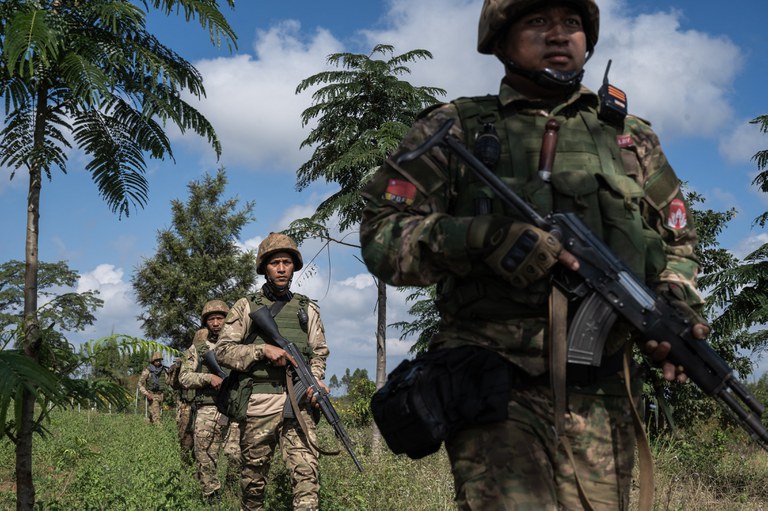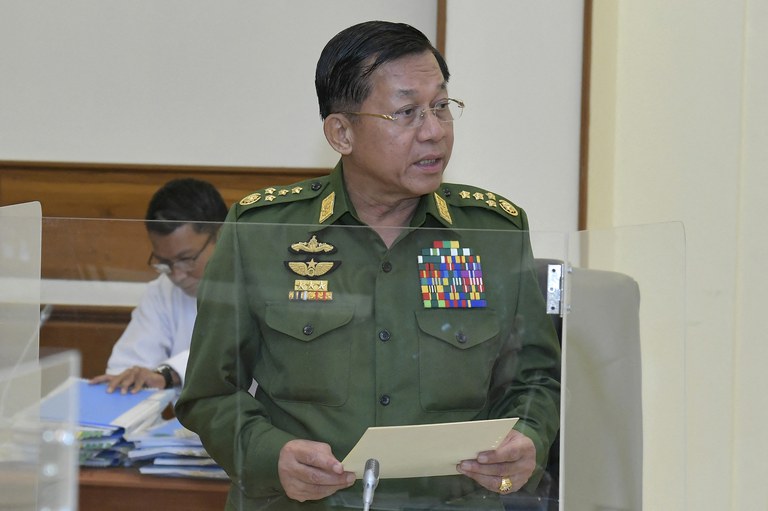Speculation is swirling over the fate of six brigadiers-general from the Burmese military following their surrender of a strategic Shan state city to ethnic rebels earlier this month in a humiliating setback to the ruling junta.
The six were commanding officers deployed in the junta’s Kokang regional command center at Laukkai, the largest base in northern Shan state near the Chinese border. The base was overrun on Jan. 4 by the Myanmar National Democratic Alliance Army, or MNDAA, prompting 2,100 soldiers in the facility to lay down their arms.
Soldiers and family members were permitted to leave by the rebels. Sources close to the military told RFA Burmese that on Jan. 6, the six generals were flown by helicopter to the Northeast Regional Military Command headquarters, and later sent to the capital Naypyidaw.
The sources spoke on condition of anonymity due to security concerns.
AFP, citing an unnamed military source, said the six generals had been taken into custody.
The Irrawaddy online news journal on Tuesday cited unnamed “junta sources” as saying that three had been sentenced to death, and three jailed for life. The sources said the six had been charged under military law for “shamefully abandoning” their posts.
RFA could not immediately confirm the sentences. AFP on Tuesday quoted the junta spokesman Maj. Gen. Zaw Min Tun as saying there was “no sentence for the six brigadier-generals yet.”
The officers were identified as Brigadiers-General Moe Kyaw Thu, the head of Laukkai headquarters; Tun Tun Myint, the acting chief of the Kokang Self-Administered Zone; and Zaw Myo Win, commander of the 55th Division; and Aye Min Oo, Thaw Zin Oo, and Aung Zaw Lin – the heads of Operation Centers 14, 16, and 12, respectively.
Sentences may have repercussions
Analysts said that stiff sentences for the generals could have major repercussions within the military.
Zachary Abuza, a professor at the National War College in Washington and an adjunct at Georgetown University, called the reported sentences “extremely draconian,” adding that, if true, they are “likely to cause an enormous backlash within the senior officer corps,” particularly if they were simply following orders from Naypyidaw.
Regardless, he said, “no amount of scapegoats will make up for the SAC’s gross incompetence in managing the economy and war effort,” using an acronym for the official name of the junta, the State Administration Council.

Former Captain Aung Myo Khat, who now advises Myanmar’s resistance forces as part of the anti-junta Civil Disobedience Movement, agreed that the officers had likely surrendered on Naypyidaw’s orders, and that dealing with them had become a delicate situation for the junta.
“If the soldiers who retreated learn about [the junta leadership] taking such action against their commanders, there may be a rebellion,” he said. “On the other hand, if no action is taken, battalion commanders and officers … in all parts of Myanmar may also follow in their footsteps and surrender. So, I think [junta leaders] are in a dilemma.”
Than Soe Naing, a political commentator in Myanmar, said that regardless of who ordered the surrender, it was “a result of [the junta’s] mismanagement.”
“Now there are lots of complaints about [mismanagement] in the army, and soldiers have lost confidence,” he said. “The idea that they cannot win the battle and therefore have to launch a suicide attack or surrender is dominating [the mindset of junta troops] in the entire Northeast region, and its spreading.”
Leadership facing criticism
The MNDAA claims that the seizure of Laukkai resulted in the largest surrender by the military during Operation 1027, an offensive it began in late October as part of the Three Brotherhood Alliance of ethnic armies, along with the Ta’ang National Liberation Army and the Arakan Army.
Since its launch, the alliance has reportedly captured 15 cities in northern Shan state, seized control of more than 200 military camps, and prompted the surrender of some 4,000 junta troops.

Nearly three years since its February 2021 coup d’etat, the military’s control of Myanmar is “rapidly diminishing,” Zach Abuza said, noting that there are growing calls for junta chief Senior General Min Aung Hlaing to step down.
“There will be schisms within the military leadership between those who are interested in negotiating a political settlement and those who feel that the military hasn’t been sufficiently resolute in crushing the dissent,” he said.
Min Aung Hlaing has faced increasing criticism over his handling of Operation 1027 and for allowing Myanmar’s once-strong military to appear weak under his watch.
Edited by Joshua Lipes and Mat Pennington.

